Richard Henry Tawney
| Richard Henry Tawney | |
|---|---|
 Richard Henry Tawney | |
| Narození | 30. listopadu 1880 Kalkata |
| Úmrtí | 16. ledna 1962 (ve věku 81 let) Londýn |
| Příčina úmrtí | nemoc |
| Místo pohřbení | hřbitov Highgate |
| Bydliště | Anglie |
| Alma mater | Balliol College Rugby School |
| Povolání | historik a ekonom |
| Zaměstnavatelé | Londýnská škola ekonomie Glasgowská univerzita |
| Politická strana | Labouristická strana |
| Některá data mohou pocházet z datové položky. | |
Richard Henry Tawney [ričrd henri tóný] (30. listopadu 1880, Kalkata, Indie – 16. ledna 1962, Londýn, Velká Británie) byl anglický spisovatel, filosof, historik hospodářství, sociální kritik a univerzitní profesor, vlivný zastánce křesťanského socialismu a vzdělávání dospělých.
Život a působení
Vzdělání získal na Rugby School a Balliol College v Oxfordu, kde studoval moderní historii. Do Rugby School nastoupil zároveň s W. Templem, budoucím arcibiskupem z Canterbury, a zůstali blízkými přáteli na celý život. V roce 1905 se stal členem výkonného výboru „Dělnické vzdělávací asociace“ (Workers' Educational Association, WEA), od dvacátých let do roku 1947 byl jejím ředitelem a pravidelně přednášel pro dělnické vzdělávací spolky. Před začátkem první světové války přednášel na univerzitě v Glasgowě, za války byl těžce zraněn v bitvě na Sommě a v roce 1917 začal přednášet na prestižní London School of Economics, kde setrval až do konce své kariéry. V roce 1931 získal titul profesora ekonomické historie. Dvakrát neúspěšně kandidoval do Dolní komory britského parlamentu za Labour Party.
Myšlení
Jako historik a věřící anglikánský křesťan Tawney ostře kritizoval moderní „hrabivou společnost“ (acquisitive society) a svoji první velkou vědeckou práci věnoval vyvlastnění půdy šlechtou v 16. století. Začal jako radikální socialista, nicméně kritický vůči Karlu Marxovi, postupem času však opustil revoluční stanovisko a prosazoval sociální reformy, zejména rozšíření všeobecného vzdělávání.
| „ | Společnost, která uctívá získávání bohatství jako vrchol blaženosti, bude přirozeně nakloněna pokládat chudé za zatracence v příštím životě – už jen proto, aby ospravedlnila, že jim z tohoto života dělá peklo. | “ |
| — R. H. Tawney, Religion and the Rise of Capitalism (1926) | ||
Dílo
- The Agrarian Problem in the Sixteenth Century („Agrární problém v 16. století“, 1912), London: Longman, Green and Co.
- The Acquisitive Society („Hrabivá společnost“, 1920); znovu Harcourt Brace and Howe (Mineola, NY, Dover: 2004; ISBN 0-486-43629-2)
- Secondary_Education_For_All („Střední vzdělání pro všechny“, 1922)
- Religion and the Rise of Capitalism („Náboženství a vznik kapitalismu“, 1926); znovu Mentor (1953) a Peter Smith (1962; ISBN 0-7658-0455-7)
- Equality („Rovnost“, 1931; ISBN 0-04-323014-8)
- Land and Labour in China (výňatky) („Půda a práce v Číně“, 1932)
- The Radical Tradition: Twelve Essays on Politics, Education and Literature („Radikální tradice: 12 esejů o politice, vzdělávání a literatuře“, 1964), Harmondsworth, Penguin; ISBN 0-14-020834-8
Odkazy
Reference
V tomto článku byl použit překlad textu z článku Richard Henry Tawney na slovenské Wikipedii.
Literatura
- R. H. Tawney, Výdělkářská společnost. Praha: Jan Laichter 1926
- R. H. Tawney, Zásady výdělečného řádu. Praha: Jan Laichter (b.d.)
Externí odkazy
Média použitá na této stránce
Autor:
- R._H._Tawney.jpg: Library of the London School of Economics and Political Science
- derivative work: nagualdesign (talk)
Richard Henry Tawney Professor of Economic History Extracts from ‘Portraits from the past: Richard Henry Tawney 1881-1962,’ by Richard M. Titmuss in LSE Magazine, November 1971, No42, p.6 'The School was only a part of Tawney’s life as a writer and as a teacher. Despite all the legends of ‘the Squire of Houghton Street’ which accumulated between 1920 and 1949 he was not content to be the conventional academic in universities where many (as he once wrote) ‘make a darkness and call it research, while shrinking from the light of general ideas.’ After leaving Oxford with a Second in Greats (he wrote too slowly for exams; ‘I’m on the floor chewing the doormat’) he found many ways of linking life and learning; to him this was the meaning of education. He found some of these links at Toynbee Hall, as Secretary of the Children’s Country Holiday Fund, learning ‘shovehalfpenny’ at a Workman’s Club, studying poverty at the School on a grant from the Ratan Tata Foundation (which helped to bring into being the Social Administration Department in 1912-3), attending meetings at the ward level of his local Labour Party, consorting with miners and lecturing mine-owners as a member of the Royal Commission on the Coal Mines, serving on the Cotton Trade Conciliation Committee and the Education Committee of the London County Council, and above all, in his work for the W.E.A. which stretched over half a century. Tawney once told me that the fellowship of the W.E.A. has meant more to him than his connections with Labour Party, the School and the Church… He was appointed as a teacher at the School in 1920… and when appointed Professor in 1931 he was given the title but not the salary as part of his time was left free for activities outside the school… ‘Three things,’ he said, ‘have caused me to love the LSE.’ One was the intellectual dynamism. A second was its informal, egalitarian school atmosphere. The last was its sense, derived from Sidney Webb and many others, that the purpose of learning is ultimately to make a juster society –‘the School exists not for itself but for the public.’ Though he retired from the School in 1950 he went on teaching. More than ever it was accompanied by his beloved Coltsfoot tobacco, a mosaic of pipe-ash on the carpet, and much talk about how to reconcile and sustain visionary power and practical action, personal conduct and involvement in social reform.’… IMAGELIBRARY/1105 Persistent URL: archives.lse.ac.uk/dserve.exe?dsqServer=lib-4.lse.ac.uk&a...
